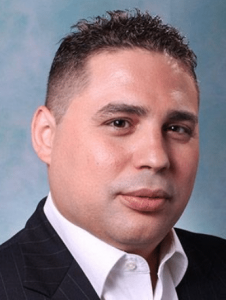U.S. evangelical leaders are urging presidential candidates to consult Scripture before finalizing their positions on immigration ahead of the 2024 election.
Filtering campaign rhetoric through the Bible would inspire policies that balance the needs of border security and compassionate care for immigrants, agreed pastors and other leaders during a Jan. 11 press call sponsored by the Evangelical Immigration Table and World Relief.

Kevin McBride
“We need to move beyond a sound-bite idea that solving the immigration and refugee issue all hinges on what kind of wall you build, and instead address the real needs of real people who are in real crisis,” said Kevin McBride, senior pastor at Raymond Baptist Church in Raymond, N.H.
“The solution for us starts with seeing the God-given value of every human life and offering people the dignity, compassion and help that we would all seek if we were in the same situation.”
Most participants on the call, like McBride, represented congregations, ministries or other Christian institutions located in states with historically pivotal presidential primaries. Their goal was to convince all presidential candidates to take the Table’s “I Was a Stranger” challenge, a 40-day program of prayer and Scripture readings infused with immigration themes.

Chelsea Sobolik
The concept of the challenge is rooted in a passage from Matthew’s gospel in which Jesus explains when his followers welcome the stranger, they are welcoming him, said Chelsea Sobolik, director of government relations for World Relief.
“This and other biblical passages instruct God’s people to show kindness and love for foreigners,” Sobolik said. “It’s why 36% of evangelical Christians nationally have been involved in a ministry that serves refugees or other immigrants at some point. And when we follow the biblical commands and enter into relationships with immigrants, it becomes very personal for many evangelical Christians.”
Immigration has clearly become a very political issue for many evangelicals, especially in primary swing states such as Iowa, New Hampshire and South Carolina.
But immigration has clearly become a very political issue for many evangelicals, especially in primary swing states such as Iowa, New Hampshire and South Carolina, she said.
“While we would never claim that the Bible provides an endorsement of any specific U.S. immigration policy, we do believe that there are biblical principles that can and should inform how Christians, including those who are seeking to become president, think and talk about immigrants and immigration, and even the public policies that they eventually pursue,” she stressed.
That also was the message of a Jan. 11 letter sent by the Evangelical Immigration Table to all presidential candidates and signed by 450 evangelical clergy and lay people.
As “Christians for whom God’s Word is our highest authority, we believe that biblical principles can and should guide both how we interact with our immigrant neighbors and how we approach immigration policy,” the letter said. “We hope you will consider this biblical wisdom as well.”

Gabriel Salguero
The letter and press call also were designed to demonstrate evangelicals are not the solid anti-immigrant voting block they are made out to be, reported Gabriel Salguero, president of the National Latino Evangelical Coalition and pastor of an Assemblies of God congregation in Orlando, Fla.
It’s erroneous to think that such lock-step uniformity even exists within ethnic groups, Salguero said.
“There are over 9 million Hispanic evangelicals across the country and, like our evangelical brothers and sisters from other cultures, we are not a monolith,” he explained. “We are not all Republicans or Democrats or Independents, and so we come to this issue from many different lenses.”
“We firmly believe that Scripture is the final word and should inform and form how we approach all aspects of life, including public policy.”
The Bible, not politics, defines evangelicals, he said. “We firmly believe that Scripture is the final word and should inform and form how we approach all aspects of life, including public policy.”
Both the nation and immigrants need an immigration policy that reflects a “both-and” approach, which respects both border security and a humane process for migrants legitimately seeking asylum. “I think we can do both,” he said.

Tony Beam
Scripture itself calls for both rule of law and compassion for the stranger, noted Tony Beam, director of public policy for the South Carolina Baptist Convention.
“God’s word affirms the role of government in maintaining order and security, which is why evangelicals tend to insist on secure borders,” he said. “But it also affirms the dignity of each person as being made in the image of God.”
 Evangelicals who struggle to embrace the compassionate dimension of immigration need only equate their concern for the unborn with the needs of migrants, Beam said. “They are important to God, and that’s why evangelicals also insist on the importance of making sure that we treat immigrants with respect and with love and try to help meet their needs.”
Evangelicals who struggle to embrace the compassionate dimension of immigration need only equate their concern for the unborn with the needs of migrants, Beam said. “They are important to God, and that’s why evangelicals also insist on the importance of making sure that we treat immigrants with respect and with love and try to help meet their needs.”
Another way to look at immigrants is as spiritual relatives, said Joel Kok, senior pastor of Covenant Christian Reformed Church in Sioux City, Iowa.
“In the Scriptures, there is one family of God and one body of Christ that’s all over the world and throughout all the nations of the world,” Kok said.
Related articles:
Evangelical Immigration Table urges Congress to consider what Jesus would do
Faith-based immigration advocates hopeful about new bill in Congress
Judge again rules DACA illegal; humanitarian advocates call for congressional response


